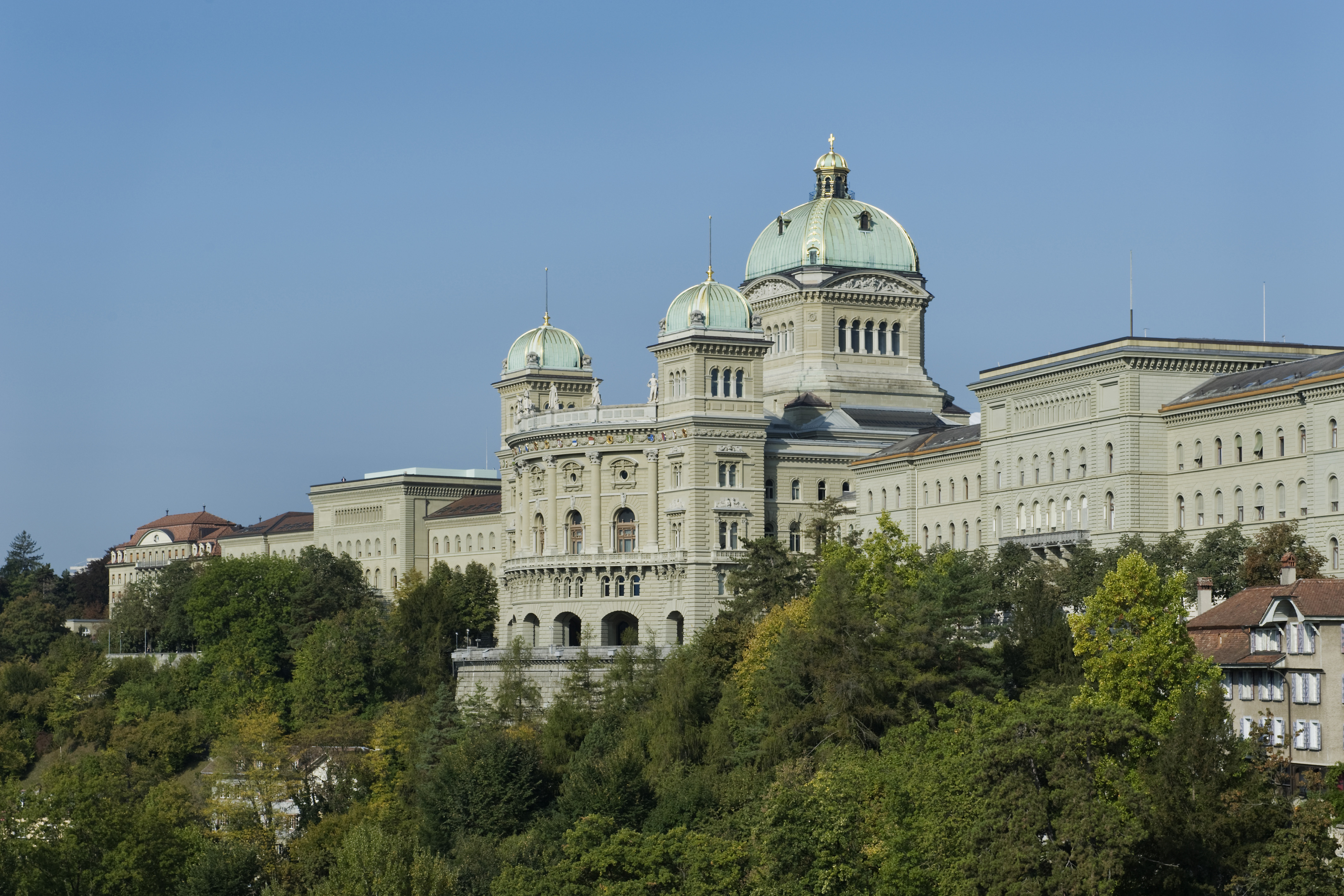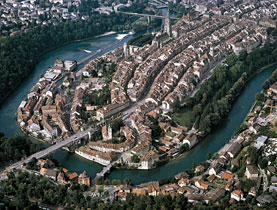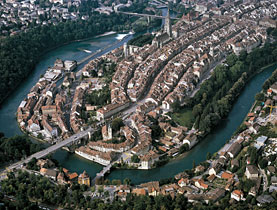Sleepy capital Bern seeks recognition

Switzerland’s capital Bern has struggled to shed the shackles of a small-town reputation in the shadows of economic powerhouses Zurich and Geneva.
A recently created association is now attempting to improve the image of Bern and the surrounding region, by boosting local development beyond its role as a political centre.
Mention the name Bern to anyone outside of Switzerland, and you might get references to a relaxed lifestyle, a world-class public transport system, a Unesco-listed old town, but few would mention it is the country’s political capital.
For the casual observer, the town and region do little to dispel the notion that it is just a provincial centre in some other country. Blink as you hit the city limits and you are out among the cow paddocks.
Bern has been fighting that idea for some time, seeking allies to improve its image at home and abroad.
There was the Espace Mittelland, which brought together a group of five cantons to defend and promote their interests. There is the Greater Geneva Bern Area economic development agency. But neither was or has been particularly successful.
For more than a year now, there has also been the Hauptstadtregion, or capital region, which has taken over some of the earlier goals of the Mittelland association. Promoted by the city and canton Bern, it brings together other towns and regions on a voluntary basis.
But can it succeed? One of the biggest challenges, apart from lacking a recognisable brand abroad, is the competition from Zurich and Geneva, and to a lesser extent, Basel.
Populate or perish
For Daniel Müller-Jentsch, project manager at the Avenir Suisse think tank, population figures already speak volumes.
“Zurich and Geneva have attracted more foreigners over the past decade,” he told swissinfo.ch. “Their population growth during the past decade was about 50 per cent above the national average, while Bern and Basel have grown 50 per cent less than Switzerland as a whole.”
Bern’s lack of an international profile doesn’t help either.
“Bern is perhaps less on the map for immigrants or international companies than Zurich or Geneva,” said Müller-Jentsch. “It is less well connected to the outside world. It does not have an international airport like the other three metropolitan areas.”
Müller-Jentsch points out that the Bern region also has an economic structure that is less dynamic and less prone to growth because it is more dependent on the federal administration.
Heike Mayer, professor of economic geography at Bern University agrees.
“There is a stable economy, because the government provides long-term employment and stable work opportunities,” she said.
“We do have a strong mix of small and medium-sized companies, but the region is not as entrepreneurial as others which might explain why it is not considered as dynamic as Zurich or Basel for example.”
Encouraging entrepreneurs
However, she says Bern compares favourably to other capital cities even though from an economic point of view, it is less dynamic than cities such as Washington, Ottawa or Vienna.
“They don’t just rely on their capital city function, which provides them with some stability, but they also focus on diversification and expansion, specialising on knowledge-based industries,” she told swissinfo.ch. “So these cities are taking steps to enlarge their economic base.”
Mayer, who led a study of the Bern region’s capital city functions for the Hauptstadtregion association, reckons there is some scope for development.
“Bern has the potential to develop as a centre for decision-making,” she said. “There is a concentration of the executive and the legislative functions in one place, plus all the businesses that rely on those political functions, such as lobbyists and public relations firms or IT companies working for the administration.”
The recently published study suggests the capital region needs to work on its image as a creative, innovative and dynamic centre, but also be clear about what is has to offer and what role it can play.
Creating a niche
For Müller-Jentsch, the focus should be on a niche strategy, much like Zurich has specialised in finance and services, or the Lake Geneva region has encouraged multinationals to set up headquarters.
“Bern doesn’t have that so they to work with what they have, which is not just the federal administration, but also the host of value-added activities and service industries that surround this government cluster,” he said.
“I think it is important to think along those lines and add to those strengths, but it would also be dangerous to just rely exclusively on publicly financed institutions.”
However playing a different role to the major economic centres can be an advantage too, says Mayer, offering the capital a form of independence while remaining within easy reach.
That proximity could also be another selling point for the capital region reckons Müller-Jentsch.
“Switzerland is one big city system,” he said. “Bern can benefit from a spill over effect from Geneva and Zurich because both are victims of their own success and face growth constraints such as housing shortages or traffic congestion.”
The Hauptstadtregion association is based on the idea of a cooperation zone, a flexible network of members and so-called “observers”.
Its members include five cantons (Bern, Fribourg, Neuchâtel, Solothurn and Valais), 12 cities and towns – such as Bern, Fribourg, Thun Solothurn, Biel or La Chaux-de-Fonds, regional associations and groups of communes.
Observers include towns such as Neuchâtel or Bulle, and regions such as Emmental.
Rather than implementing projects within a rigid structure, members and observers will be able to decide whether or not they take part on an individual basis.

In compliance with the JTI standards
More: SWI swissinfo.ch certified by the Journalism Trust Initiative














You can find an overview of ongoing debates with our journalists here . Please join us!
If you want to start a conversation about a topic raised in this article or want to report factual errors, email us at english@swissinfo.ch.